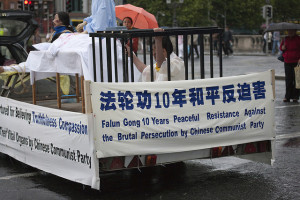This Includes Those Who Brought Light to the Issue in The First Place
 China made headlines several months ago for its announcement to abolish re-education camps. These labor camps existed for over 50 years and imprisoned millions without trial, many of them are offenders of minor crimes, religious activists such as members of the Falun Gong, or are considered "political troublemakers." Part of this transition involves changing the re-education camps into drug rehabilitation centers, where many were released from the camps, except for those who were imprisoned for drug-related offenses.
China made headlines several months ago for its announcement to abolish re-education camps. These labor camps existed for over 50 years and imprisoned millions without trial, many of them are offenders of minor crimes, religious activists such as members of the Falun Gong, or are considered "political troublemakers." Part of this transition involves changing the re-education camps into drug rehabilitation centers, where many were released from the camps, except for those who were imprisoned for drug-related offenses.
This announcement sounds like great news and seems like a turnaround for the criminal justice system, but if that's the case, then why is anti-corruption activist Liu Hua detained by government officials?
Who is Liu Hua?
From 2006 to 2011, Liu Hua served three terms in the Masanjia Women’s RTL camp for her efforts to expose corruption in Zhangliangbao. Upon her release, she was interviewed as part of an investigative article for Lens, a Chinese photography magazine, which documented the appalling conditions at the camp. She was then featured in the documentary ,"The Women of Masanjia Labor Camp," directed by Du Bin. In the documentary, Hua detailed various tactics the guards used to beat female detainees.
Since then, she has been detained by public security officers in Beijing. She is currently being held at the Shenyang Number 1 Detention Centre, where she is being questioned repeatedly about the allegations of torture she made in the documentary. As someone who helped expose the abuses in China’s Re-Education Through Labor system, Liu Hua has been criminally detained on the charge of “picking quarrels and making troubles”.
To learn more about labor camps in China, then this issue brief has more information and actions regarding the re-education through labor system as well as freedom of expression in China. This issue brief was also used as the source for the information about Lin Hua. You are also welcome to watch the documentary previously mentioned, as it is placed below. This is the full documentary, with subtitles in both English and Chinese.
Write a Letter on Behalf of Liu Hua
Liu Hua has been actively outspoken for others in Masanjia Women’s RTL camp, as well as other labor camps throughout China. Her activism contributed to the resolution passed by the Chinese government to abolish the re-education through labor system. Now, it is our turn to be active on her behalf and to write a letter asking the Chinese government to release her immediately and unconditionally.
Below is a sample letter that you can copy yourself, either by writing it by hand or by printing it out, and send on behalf of Liu Hua. The sample letter includes an address and addressee, which was pulled from the previously mentioned issue brief about re-education through labor. The brief does include additional addresses and background information.
Sample Letter
Shenyang Detention Centre Director
Gaoli Cun
Zaohua Xiang
Yuhong Qu
Shengyang, China
Dear Director,
I am writing in concern for LIU HUA*, who has been criminally detained on the charge of "picking quarrels and making troubles." It is believed that she is being punished for appearing in the documentary, "The Women of Masanjia Labor Camp", which detailed torture and other ill-treatment faced by female detainees at the re-education camp.
I call on the authorities to release LIU HUA immediately and unconditionally.
Please do not penalize or criminally charge individuals who reveal information regarding human rights violations to ensure that whistle-blowers are not subjected to retaliation. Do not charge these individuals unless they are charged with an internationally recognized criminal offense. This includes LIU HUA.
Also ensure that all criminal investigations, including on corruption - which has human rights implications – follow international standards so that they are prompt, impartial, effective and that the public are informed of their conclusions.
Sincerely,
Your Name
*The name is capitalized and underlined so it sticks out in the letter. Since we're writing a letter in English to a Chinese-speaking country, it's likely that the only words that will be recognizable in the letter is the person's name. Making the name more prominent tells the addressee who we're talking about, even if he or she won't understand the rest of the letter. This practice is common in letter-writing activism since the letters often go to countries where English isn't a predominant language.
Photo Credit: William Murphy
